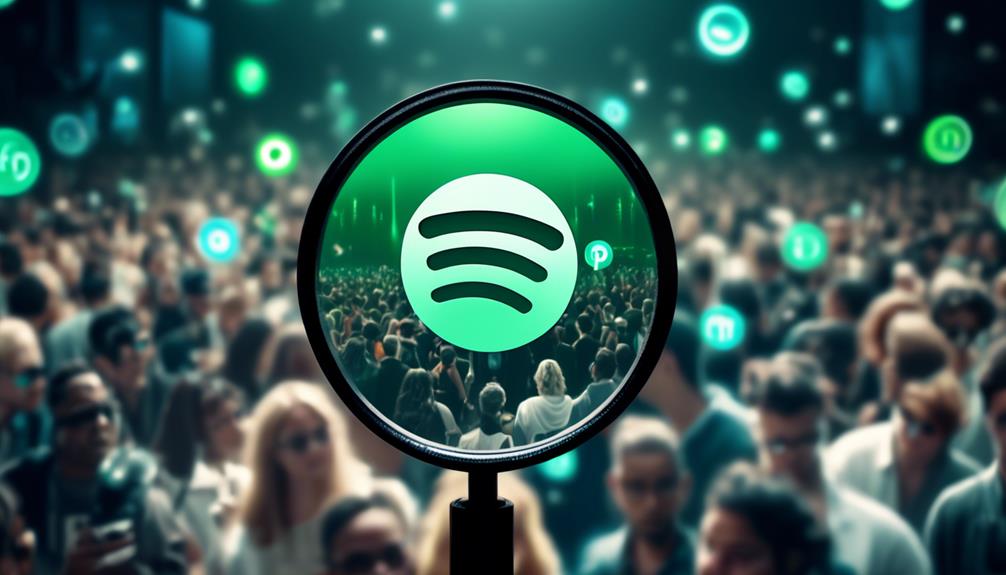
Is it legal to buy Spotify monthly listeners?
As the old saying goes, ‘there’s no such thing as a free lunch,’ and this adage couldn’t be more apt when discussing the concept of buying Spotify monthly listeners.
You’ve probably wondered if it’s possible, and more importantly, if it’s legal to purchase these listeners as an easy way to boost your streaming numbers. While it might seem like a simple way to gain popularity, it’s important to consider the legal implications and the potential consequences of such actions.
Not only that, but the ethical considerations and the impact on genuine listeners and artists are also aspects worth contemplating.
So, is it a straightforward yes or no, or is there more to this story than meets the eye? Let’s find out.
Key Takeaways
- Buying Spotify monthly listeners is against Spotify’s terms of service and can result in penalties and account suspension.
- Purchasing listeners raises ethical concerns about authenticity, fairness, and its impact on artists relying on platforms for exposure and income.
- Buying listeners distorts listener demographics, leading to misguided marketing strategies and a disconnect between artists and genuine fans.
- Spotify discourages the use of fake streamers, has penalties in place to protect the authentic user experience, and actively detects and removes fake streamers.
Understanding Spotify’s Terms of Service

So, what exactly does Spotify’s Terms of Service entail when it comes to purchasing monthly listeners?
A terms interpretation reveals that Spotify doesn’t explicitly allow or encourage such practices. Instead, it emphasizes on organic growth and authentic listener engagement.
Services misuse is a focal point in Spotify’s terms. You mustn’t employ tactics that artificially inflate your numbers, a category that purchasing listeners often falls into. While it might seem like an innovative shortcut to boosting your music’s reach, this approach can lead to penalties, including possible account suspension.
Spotify’s algorithms are designed to identify and combat inauthentic behavior. They’re constantly evolving, improving their detection capabilities. If you’re determined to rise in the Spotify ranks, it’s more beneficial to harness your creative energy and focus on producing quality content, which naturally attracts and retains listeners.
The Concept of Buying Listeners
Despite Spotify’s stance, the concept of buying listeners has gained traction in recent years, presenting a tempting shortcut to artists seeking to rapidly inflate their listener base. The idea is simple: you pay a service, they deliver listeners to your account. However, this practice has been widely criticized for its impact on listener authenticity and its role in streaming manipulation.
Consider these key points:
- Listener authenticity: When you buy listeners, you’re not getting genuine engagement. These ‘listeners’ are typically bots or inactive accounts, incapable of appreciating your music. This undermines the authenticity of your listener base, potentially damaging your reputation.
- Streaming manipulation: Buying listeners can artificially inflate your stream count, creating a distorted perception of your popularity. This can lead to accusations of streaming manipulation, a practice that’s frowned upon in the industry.
- Legal implications: While the legality of buying listeners is a gray area, it’s worth noting that it does violate Spotify’s Terms of Service. This could result in penalties, including the removal of your music from the platform.
In the pursuit of innovation and authenticity, it’s essential to weigh the potential benefits against the risks.
Legal Implications of Buying Listeners

Diving deeper into the legal implications, it’s crucial to understand the potential risks and repercussions of buying listeners on Spotify. While some vendors might exploit legal loopholes and claim their services are lawful, it’s important to remember that Spotify’s terms and conditions explicitly prohibit manipulative behavior.
Failing to adhere to these rules can result in penalties ranging from a warning to the suspension of your account. Besides, buying listeners undermines listener authenticity, which is a key component of the Spotify experience. When you buy listeners, you’re essentially paying for a number, not genuine engagement. This may skew your analytics and deter real listeners who value authenticity.
Innovation should never come at the cost of legality or authenticity. As tempting as it might be to buy your way to popularity, it’s critical to build your listener base organically. The long-term gains of a genuine audience far outweigh the short-lived boost that purchased listeners provide.
Ethical Questions Surrounding the Practice
While it’s legal to buy Spotify monthly listeners, you must also consider the ethical questions this practice raises. Does paying for listeners give some an unfair advantage, and what’re the moral implications of such choices?
Consider, too, the potential impacts on artists who depend on these platforms for exposure and income.
Morality of Purchasing Listeners
You might wonder about the ethical implications of purchasing Spotify monthly listeners, as this practice raises complex moral questions that warrant careful consideration. Listener Authenticity and Purchased Influence are two primary concerns that emerge.
- Listener Authenticity: When you buy listeners, are you genuinely connecting with your audience or merely inflating numbers? Authenticity in listenership is vital in creating a real impact and influence.
- Purchased Influence: Buying listeners can skew the perception of popularity and success, potentially misleading audiences and other artists.
- Fairness: Is it fair to artificially elevate one’s status, potentially overshadowing deserving artists who’ve earned their audience organically?
Exploring these questions, it becomes clear that while it might be legal, the morality of purchasing listeners is a nuanced issue.
Unfair Advantage Debate
Building on the ethical concerns already discussed, let’s further scrutinize the disquieting notion of unfair advantage that buying Spotify listeners can present.
A core issue is listener inequality. When an artist buys listeners, it creates an imbalance, skewing the playing field and stifling organic talent discovery. You’re essentially purchasing popularity, not earning it through merit.
This practice also raises monetization issues. Artists receive revenue based on their play count. If these numbers are artificially inflated, it undermines Spotify’s revenue model and potentially cheats other artists out of their rightful earnings.
Potential Impact on Artists
Let’s delve into the ethical quandaries this practice poses for artists, particularly how it might impact their careers and the authenticity of their work.
The purchase of monthly listeners can distort listener demographics, skewing the true picture of who’s engaging with music. This potentially leads to misguided marketing strategies and misrepresentation of an artist’s popularity.
Here are some key concerns:
- Revenue implications: Artificial inflation of listener numbers won’t translate into real-world concert tickets or merchandise sold.
- Inauthentic fan base: The practice could lead to a disconnect between artists and their genuine fans.
- Undermining artistic credibility: Artists may lose respect within the industry if their success is attributed to bought listeners.
Impact on Artists and Genuine Listeners
The purchase of Spotify monthly listeners presents a significant impact on both artists and genuine listeners, altering the authenticity of the music industry. This practice directly undermines listener engagement, potentially distorting the music quality that’s recognized and promoted.
As an artist, you’re driven to create the best music you can, hoping to engage listeners genuinely. However, when other artists inflate their listener numbers artificially, it can skew the playing field. Your music may be overlooked in favor of those with inflated numbers, even if your music quality is superior.
As a genuine listener, your engagement with the music you love also suffers. You’re drowned in a sea of artificially popular tracks, potentially missing out on music that truly resonates with you. The algorithm becomes less about your tastes and more about who can pay to play.
Innovation thrives in an environment of authenticity and fair competition. The music industry should be a platform to celebrate genuine talent, not a marketplace for bought popularity. As we navigate the digital age, it’s essential to consider the fair and equitable use of platforms like Spotify.
The integrity of our music culture depends on it.
Alternative Ways to Increase Listeners

Instead of resorting to buying listeners, you can employ authentic strategies to increase your Spotify audience organically, offering a more genuine interaction between you and your audience. This not only boosts your audience numbers but also cultivates a loyal fan base, fostering credibility and longevity in your music career.
In the spirit of innovation and authenticity, consider these strategies:
- Promoting playlists organically: Utilize social media platforms to share your Spotify playlists. This not only increases your reach but also exposes your music to an audience that genuinely enjoys your genre.
- Collaborating with artists: Work with other musicians on Spotify. This cross-pollination of audiences can help you gain new listeners who are already interested in your style of music.
- Optimizing your Spotify profile: Ensure that your profile is complete, aesthetically pleasing, and professional. This can significantly influence a listener’s decision to follow you or not.
Spotify’s Stance on Fake Streamers
You might ask, what’s Spotify’s stance on fake streamers?
It’s key to understand Spotify’s terms and conditions, which clearly discourage such practices.
Consequences of fake streams are serious and exist to protect the authentic user experience.
Understanding Spotify’s Terms
While it’s tempting to buy Spotify monthly listeners, it’s crucial to understand that Spotify’s terms of service strictly prohibit the use of fake streamers. Spotify’s algorithm is designed to detect and penalize such behavior. It’s not only a question of legality, but also of ethics and fairness.
- Spotify’s terms explicitly state that manipulating streams isn’t allowed.
- Listener demographics play a significant role in how Spotify values streams. Fake listeners can skew these metrics and disrupt the platform’s ecosystem.
- Spotify has the right to suspend or terminate accounts suspected of artificial streaming.
Consequences of Fake Streams
Facing the repercussions of fake streams, Spotify has adopted a firm stance against artificial streamers, imposing penalties that can significantly impact your account. Stream manipulation, essentially buying listeners, not only undermines the authenticity of the platform but also leads to revenue loss. Spotify has a zero-tolerance policy for such practices. If detected, your account may be suspended or terminated.
The integrity of data is vital for Spotify’s ecosystem, ensuring fair remuneration for artists and maintaining user trust. So, while the allure of quick success might tempt some, it’s crucial to remember that these shortcuts carry serious consequences. Innovating within the platform’s rules will always yield more sustainable results.
Protecting Authentic User Experience
In light of these consequences, Spotify has doubled down on efforts to preserve the authenticity of the user experience, aggressively combating fake streamers. The platform has recognized the harm of user manipulation and the dilution of authenticity that results from these artificial streams.
To maintain a user-oriented approach, Spotify has implemented innovative strategies:
- Robust algorithms to detect and remove fake streamers, ensuring that each play comes from a real user.
- Strict policies against the purchase of monthly listeners, to discourage user manipulation.
- High transparency with its user base, encouraging an open dialogue about the impacts of authenticity dilution.
Risks Associated With Purchasing Listeners
Despite the allure of having an instant audience, you should be aware of the potential risks that come with purchasing Spotify monthly listeners. The impact of a fake audience can be detrimental to your music’s organic growth. When the bulk of your listeners are inauthentic, it creates a distorted image of your popularity and can deter genuine listeners.
Another risk is the decline of listener engagement. Engagement is a crucial factor in Spotify’s algorithm that influences your visibility on the platform. When you purchase listeners, you’re not just buying numbers, you’re also buying a lack of engagement. These purchased listeners are unlikely to interact with your music by liking, sharing, or adding your tracks to their playlists.
Also, let’s not forget Spotify’s stringent policies against artificially boosting listener numbers. Breaching these rules can lead to penalties, including suspension or removal from the platform.

